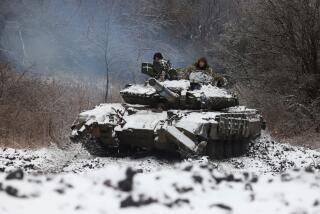COLUMN RIGHT/ JOHN LENCZOWSKI : Was the Coup Everything It Seemed to Be? : The blunders seem so implausibly great that we can’t take events at face value.
- Share via
The events in the Soviet Union over the past three days have been so strange that they give rise to many more questions than answers. Yet one of the most regrettable features of this episode has been the willingness of too many observers to make snap judgments on the basis of extraordinarily incomplete information.
The main question, of course, is: Who was behind the apparent coup, and what was its real purpose?
On its face, it appeared to be a desperate effort by Communist Party hard-liners (with their security and military-industrial constituency) to stop the erosion of party power. A variant of this explanation is that a collection of party die-hards and Russian nationalist Bolsheviks were attempting to “save the Motherland” from disintegration and further economic, “moral” and geopolitical decline.
If either of these was the epic cause of the plotters--causes surely worth fighting for--then why did they back down so quickly, without a fight? Why didn’t they arrest all of the guilty parties? Why didn’t they cut off all communications to the outside world? Why did they allow Boris Yeltsin’s appeal for resistance to be broadcast over media they controlled?
If the KGB chief was a participant, then where was the KGB? If the Interior Ministry (MVD) was part of it, then where were the “black berets” who cracked down in the Baltic states? Why weren’t politically reliable and disciplined KGB and MVD troops and agents deployed, as opposed to 19-year-old army conscripts? When attempts were made to breach Boris Yeltsin’s barricades, why were only armored personnel carriers used, rather than more powerful or effective means?
Was it because the coup plotters became divided and couldn’t agree on how Draconian they should be? Was it because those plotters who commanded armed forces couldn’t rely on their troops? If so, then why did they mount the coup in the first place? There have been many reports of lack of discipline within the Soviet army, but is the same true of the KGB?
If it is true that several of the coup plotters escaped at the end, why? Were they really under pressure or imminent danger? Indeed, the opposite seemed to be the case: It was Yeltsin who was holed up behind barricades, not the aggressors.
And who made the decision to order the military to retreat, and with such discipline? Someone did. Someone with considerable authority. Was it a plotter having second thoughts--Defense Minister Gen. Dmitri Yazov perhaps? Or did the order come from Gorbachev? Or Yeltsin?
It strains credulity to assert that stupidity and incompetence explain the plotters’ failure to take decisive action. It is equally implausible that international opinion was a constraint, given that it didn’t prevent the original action in the first place. Even if there were splits among the plotters or the various security forces, why didn’t we see violence at the hands of the most desperate of those forces? Did they see themselves outnumbered? Or were the party members in those forces missing a new, “legitimate” party line, which they would be obliged to follow?
These explanations lose whatever plausibility they might have when one considers that a coalition of very powerful men took the grave step of initiating an action that could cost them their lives if it didn’t succeed.
Given these questions, we can conclude with certainty only that we do not know all there is to know. And given such uncertainty, we must rely on one maxim of Soviet-watching: Don’t always take events in the the Soviet Union at face value. The history of Soviet secrecy, deception and intrigues is so extensive that we must not categorically dismiss even some of the wild speculations that informed insiders have tossed out for consideration. For example, figures like Eduard Shevardnadze, Georgian President Zviad Gamsakhurdia, democratic leader and chess champion Gary Kasparov and KGB defector Victor Sheymov have suggested that this may have been a “Potemkin coup” orchestrated by Gorbachev himself for the purpose of enhancing his prestige, securing more aid from the West and ultimately saving the socialist system.
This writer finds that scenario unlikely, given the price that had to be paid: the further incitement of civil society against the old Communist order. But since information supporting any theory is still so utterly incomplete, prudence dictates that U.S. policy--on whether to send more aid, transfer sensitive technology or ratify the START treaty--should await more conclusive evidence.
More to Read
Sign up for Essential California
The most important California stories and recommendations in your inbox every morning.
You may occasionally receive promotional content from the Los Angeles Times.













